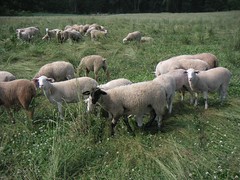 Good nutrition is one factor that helps promote immunity and resilience to parasite infections. Sheep less than 12 months of age are most susceptible to the harmful effects of internal parasites. Pregnant ewes often suffer a breakdown in immunity to parasites around the time of lambing, making them a potent source of worm infection in their lambs.
Good nutrition is one factor that helps promote immunity and resilience to parasite infections. Sheep less than 12 months of age are most susceptible to the harmful effects of internal parasites. Pregnant ewes often suffer a breakdown in immunity to parasites around the time of lambing, making them a potent source of worm infection in their lambs.According to a fact sheet from Australia, "Nutritional supplementation is most likely to be beneficial when pregnant ewes and lambs are below optimal body condition at a time when pasture quality and/or quantity is limited."
Maintaining body weight during late pregnancy, when lambs are growing rapidly, appears to be a critical factor in maintaining immunity to parasites. Australian research has shown a benefit to maintaining ewes at a body condition score of 3 versus 2.
Increasing the protein intake of ewes during the six weeks prior to lambing is particularly effective in preventing an increase in worm egg counts in pregnant ewes. Numerous field trials have shown a beneficial response to providing young weaner lambs with a high-protein supplement as a strategy to manage parasitism and reduce production losses.
A major benefit of using nutrition to limit the effects of parasites is the reduced need for anthelmintic treatment, thereby slowing the development of worm resistance to drench chemicals.
For more information about using nutrition to control parasites, read Meat & Livestock Australia's 2007 fact sheet "Improving internal parasite control in sheep with nutrition."
